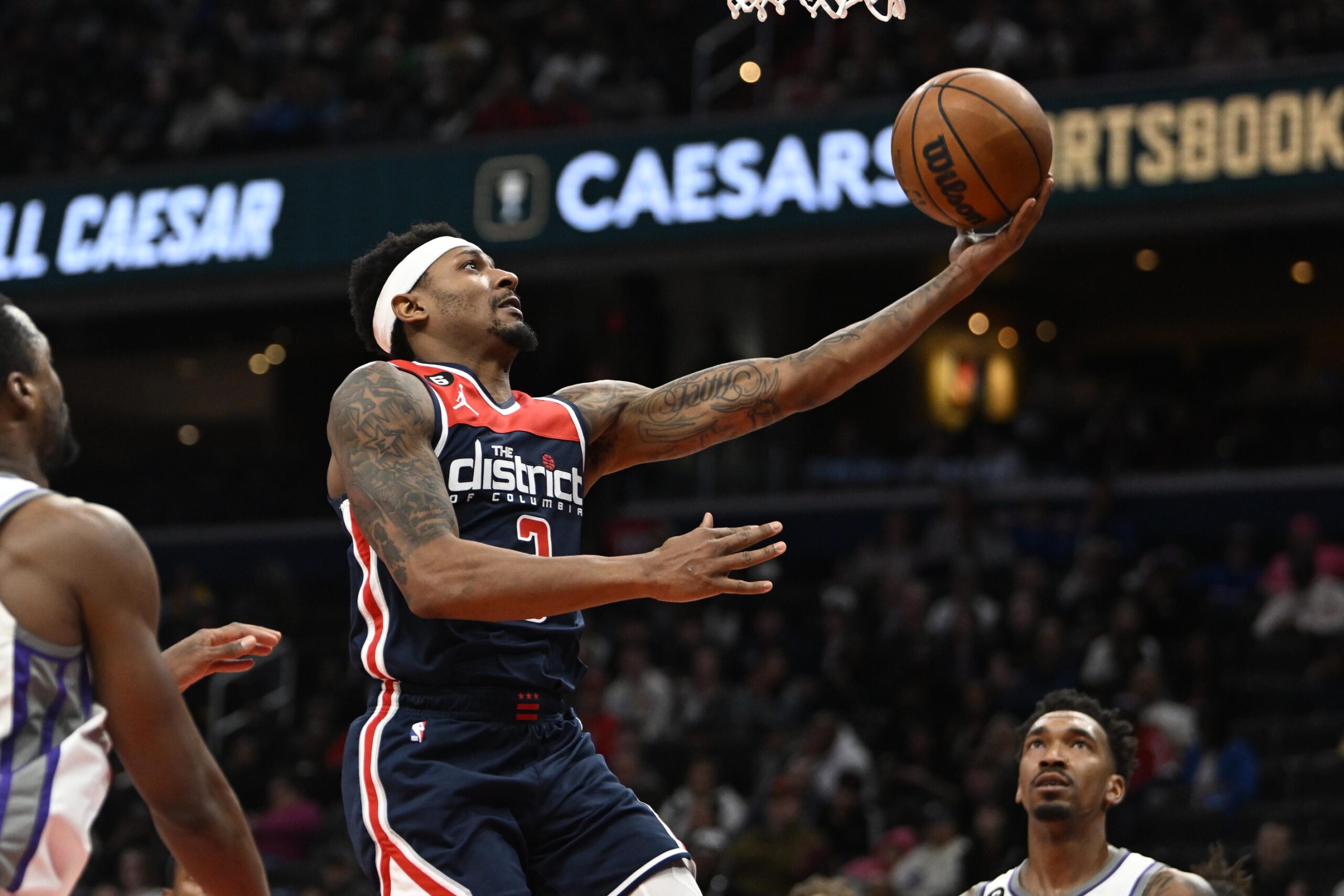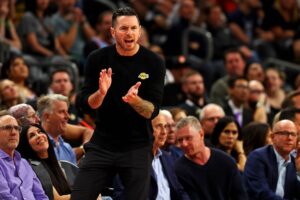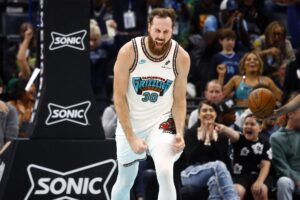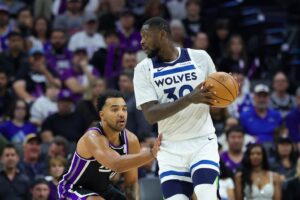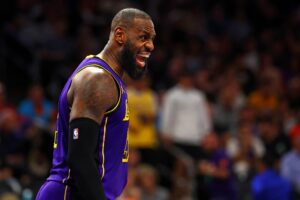Around a week ago, I wrote about the five greatest teams in Washington Wizards history. The team was also previously known as the Washington Bullets and Baltimore Bullets (first two seasons were also spent in Chicago). It was pretty fun and inspired me to do something similar. Today, I’m ranking the ten greatest Wizards in franchise history. While this list certainly won’t be as legendary as a team like the Celtics, Warriors, or Knicks, the Wizards have had quite a few storied players come through the franchise.
With that being said, I would like to make one thing clear: these are the 10 greatest Wizards of all time, not the 10 greatest players to ever play for the Wizards. So with that in mind, shoutout to Michael Jordan, Moses Malone, Richard Hamilton, Ben Wallace, Jerry Stackhouse, and Russell Westbrook; but they will not be in the top ten.
The 10 Greatest Wizards in Franchise History
10. Caron Butler
Initially, I had trouble deciding whether number ten should go to Caron Butler or Walt Bellamy. However, I decided on Butler, since Bellamy’s time with the franchise came in the 1960s, and only spanned two years. Butler (along with Gilbert Arenas and Antawn Jamison) made up the Wizards’ big three during the mid-2000s. This period marked one of the most exciting for Wizards fans during the century, as the team was competitive and seemed to have a legitimate path to the Eastern Conference Finals for a few years. Of course, LeBron James proved a difficult roadblock to stop, but the team got close!
Butler’s prime indisputably came during those mid-2000s with the Wizards. He was named an All-Star twice, and averaged 20.3 points and 6.7 rebounds during the 2007-08 season. While those Wizards sadly broke up, Butler continued to have a long NBA career with several teams before retiring. His short tenure and two All-Star selections are the reason he sits at number ten.
9. Bernard King
Bernard King proved to be one of the flashiest and best scorers in the NBA during his time in the league. The majority of his career was played in the 1980s, with the Nets, Warriors, Knicks, and Bullets. Unfortunately, injuries to his knee cost him three seasons of his career, including two in his prime. Coming off the 1984-85 season with the Knicks, King led the league in scoring, averaging 32.9 points per game. Over the next two years, he would play a total of just six games due to injury. In 1987, he signed as a free agent with the Bullets. King needed a few seasons to ramp back up to his previous levels of production, but he eventually got there in his fourth and final season with the Bullets. During the 1990-91 season, King was finally named an All-Star again, and averaged 28.4 points per game.
Unfortunately, the Bullets only made the playoffs during King’s first season with the team. He only spent four seasons with the Bullets, which is why he’s so low in the top ten. Even with the devastating knee injuries, King had an amazing career. However, it was divided pretty evenly among the four teams he played with, meaning that he can’t be higher on this list.
8. Chris Webber
Chris Webber is among the best power forwards to ever play the game of basketball. In the late 1990s and early 2000s, Webber was an instrumental piece of the Bullets/Wizards and Sacramento Kings. He’s best known for his time with the Kings, as that’s where he spent his prime, racked up four All-Star appearances, and challenged Kobe Bryant and Shaquille O’Neal for Western Conference supremacy during their three-peat.
Even though the Kings may have been his peak, Webber’s time with the Wizards was what launched his career. In four years, Webber averaged 20.9 points, 9.7 rebounds, 4.4 assists, 1.6 steals, and 1.7 blocks per game while shooting 50.1% from the field. His best season with the Wizards came in 1996-97, where he earned his first All-Star appearance. Additionally, the 1996-97 season saw Webber lead the Wizards to the playoffs for the first time in a decade. He’s one of the greatest power forwards in the history of the game, but he’s not one of the greatest Wizards purely because of how short his tenure with the team was.
7. Earl Monroe
Earl Monroe‘s time with the Bullets came towards the end of the 1960s, and the beginning of his career. He peaked early (which you can view as good or bad, since the peak came with the Bullets). During his first season in the NBA (1967-68), he won the league’s Rookie of the Year Award. Every season he played with the Bullets, he averaged over 20 points per game. Unfortunately, Monroe only played with the franchise for barely over four seasons, which is why he’s not higher on this list.
Monroe (like the player ahead of him on this list) came right before the 1970s, which was the Bullets decade of dominance. He helped lay the framework in place for the team that emerged and inspired with his game. However, given his short tenure, Monroe is only at number seven on the list of the greatest Wizards/Bullets.
6. Gus Johnson
Gus Johnson spent nine seasons with the franchise back when they were called the Baltimore Bullets. As a six-foot-six small/power forward playing in the 1960s and 1970s, Johnson dominated his competition. He averaged 18.2 points and 17.1 rebounds in his best season, and averaged a double-double for eight of his nine seasons with the Bullets. Johnson finished his career as a five time All-Star, with all five appearances coming during his time with the Bullets.
Johnson was the precursor to the Bullets decade(ish) of dominance during the 1970s. He helped lead the Bullets to a Finals appearance in 1971, and two playoff appearances before then. However, Johnson’s career only spanned 10 years. While it’s impressive that he spent so much of that time with the Bullets, his career was much shorter than many of the other players on this list. His contributions to the Bullets won’t be forgotten, but in terms of this list, his time in the league and the era he played in works against him.
5. Bradley Beal
Bradley Beal is the most recent player on this list to play for the Wizards. His time with the team spanned 11 seasons and virtually all of his prime. Beal’s tenure can seemingly be split up into halves. The first half was with John Wall (2013-2018), where the team was good and made the playoffs regularly. The other half was after (post 2018), when the Wizards reverted to their mediocre ways and only made the playoffs once. As Beal came into his prime, he put up amazing numbers for the Wizards, and showed he could do more than be Wall’s sidekick. Once known primarily for catch-and-shoot threes, Beal became a ball-dominant guard who took more threes, more shots off the dribble, and scored a lot. During the 2020-21 season, Beal almost lead the league in scoring, averaging 30.5 points per game.
The consensus around Beal was that he shouldn’t have stayed with the Wizards for as long as he did. He spent most of his prime with a team that simply didn’t win many games, and they didn’t have much to put around him in the way of talent. Still, even if there was financial incentives to stay, Beal should be commended for sticking with his team for as long as he did. Many other superstars at that point in league history would have quickly demanded a trade, and made it quite unpleasant for their team’s front office. For staying with the Wizards through thick and thin and doing so much to give back to his community, I have Beal at number five.
4. Gilbert Arenas
Arenas is this high up the list because of how electric his prime was, and the fact that he inspired hope in Wizards fans for a few years. Coming into the NBA, Arenas had no expectations from outsiders for his gameplay. It is why he wore the number zero: it’s the number of people who believed he would last in the NBA. After two promising years with the Warriors, Arenas won the league’s Most Improved Player Award, and signed with the Wizards in 2003. Arenas hit his prime in DC, earning All-Star honors for three straight years. During that three year span, he averaged 27.7 points, 5.7 assists, 4.3 rebounds, and 1.9 steals per game. Arenas led the team in win shares all three of those years, and despite their record always hovering slightly over .500, they made the playoffs.
Alongside Antawn Jamison and Caron Butler, the Wizards big three made it to the second round during the 2004-05 season, a team that I talked about more deeply here. While it was first-round exits for the next two years afterwards, Arenas gave Wizards fans hope and something to talk about. The future seemed bright. Then, a scandal turned the team upside down and flipped everyone’s career trajectories.
Arenas missed the majority of the next three seasons, at first due to suspension and then due to injury. He wasn’t the same player afterwards, and the Wizards traded him to the Orlando Magic in 2010. While Arenas’ star may not have shined for long in Washington, it sure shined bright when it did.
3. John Wall
Wall is the clear number three for the Wizards all-time list. He spent his entire prime with the team, and lifted them towards some of their greatest moments in modern history. As I mentioned in this list of the greatest Wizards teams of all time, the 2016-17 Wizards were one of the great teams that inspired Wizards fans and gave them hope, and Wall was leading the charge. During his five years as an All-Star for the Wizards, he averaged 19.9 points, 9.9 assists, 4.4 rebounds, and 1.8 steals. His greatest season was that 2016-17 season, where he averaged 23.1 points and 10.7 assists per game. Injuries devastated him and his late prime, and eventually the Wizards traded him to the Rockets for Russell Westbrook. Still, the #1 overall pick from the 2010 NBA Draft will always have a spot in the hearts of Wizards fans.
2. Elvin Hayes
At first I had Wall over Elvin Hayes, but then I quickly realized that was recency bias. Wall played for the Wizards in the last decade, and he was a key part of my fandom growing up. I never watched Hayes play a game live, as his playing career was well over before I was born. Still, Hayes’ accolades and accomplishments with the franchise far exceed Wall.
Hayes finished his career as a 12-time NBA All-Star, a six-time member of the All-NBA, and a three-time member of the All-NBA First team. He led the league in scoring his rookie season, led the league in rebounding twice, has career averages of 21.0 points and 12.5 rebounds per game, and helped lead the Wizards to their only championship in 1978. It’s not like that year was a fluke, though. All but one of the four finals appearances in franchise history happened when Hayes was on the team, with the other being a year before he arrived. Every year except for his last with the Bullets, the team made the playoffs. It’s clear why Hayes is a Hall-of-Famer, and as much as I love Wall, Hayes did a lot more in nine seasons with the franchise than Wall did in his nine healthy seasons with them.
The Greatest Wizards Player: Wes Unseld
Wes Unseld just has to be number one. He brought the franchise their only ever championship in 1978, and that was just the cherry on top of an already historic career. Unseld won Rookie of the Year and MVP in his first season out of Louisville. He averaged 10.8 points and 14 rebounds per game for his career, and spent the entirety of it (13 seasons) in Washington. Despite being undersized for a big man at six-foot-seven, Unseld rebounded with the top centers in the league. He carried the Bullets through their decade of dominance, accounting for all of their playoff appearances in the 1970s. For an entire career with the team, an NBA championship, and a legacy of excellence, the five time All-Star is the greatest player in franchise history.


